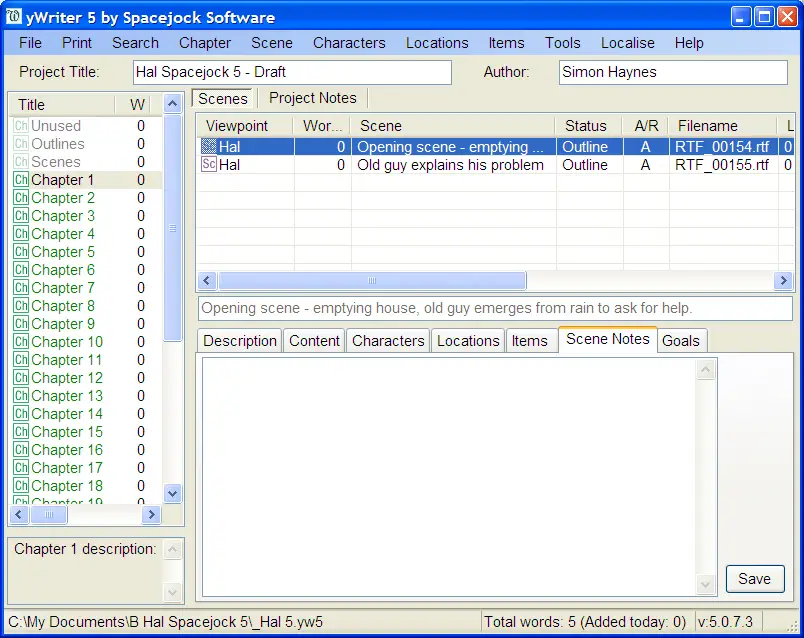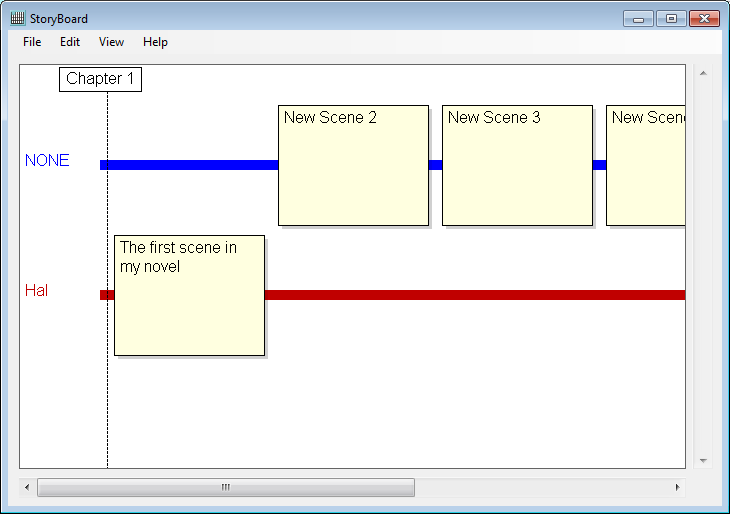If you’re a writer or storyteller in any capacity, you’ve probably run into some serious organization woes. I’ve been there, too. Is that small, probably unnecessary detail about Side Character B tucked in “More Writing Stuff.docx” or “Character Misc.docx”? Maybe you prefer to do all your planning by hand across several notebooks or sheets of paper. If so, you’re really screwed. Keeping a heap of brainchildren in line is a battle for all writers. Can I get a #relatable, anyone?
The more ideas you have and the more developed they become, the faster the physical or digital documents multiply, which could leave you yearning for a better method. After all, an impeccably structured set of 50 folders is still 50 folders to navigate through — and you should’ve started writing an hour ago.
The online writing community would be the first to recommend Scrivener, an alternative writing software that encloses every chapter and character outline in the same location. It’s convenient and pretty to look at, but it also comes at a $45 cost. That’s a huge investment for fledgling novelists. Luckily, it’s an entirely avoidable one. Shove the opinions of Scrivener devotees and Microsoft Word purists aside and meet the unsung hero of writing software: yWriter.
So, What Is yWriter?
Available for Windows, Linux and Mac OS (kind of) users, yWriter is a word processing software that splits your novel into scenes, allowing you to let the words flow without any organization worries. The best part? It’s completely free to use. Should you wish to support the creator, you can register your copy for a small fee. However, this is optional and you will never be forced to do so.
As designer Simon Haynes has been an author for nearly 20 years, he constructed yWriter with fellow writers in mind. Within each document, or “project,” you have the freedom to plan to your heart’s content without having to open another file. Every chapter, scene, character and setting is contained in a single package. Moreover, each of the former items can be manipulated or shifted around at any time. These two features comprise the main allure of the software.

Because I can’t resist a good cliché — but wait, there’s more! The only thing aspiring authors grapple with more than organization is, ironically, actually writing. yWriter comes equipped with a variety of tracking options to inspire and, more likely, guilt you into making progress. There’s nothing like a good dose of pressure-inducing expectations to kick off a writing session, am I right?
If you prefer to achieve your word count on a tablet or mobile device, an easy solution exists. As the outdated 2009 iPhone commercial so kindly informed us, there’s an app for that. The slight caveat is the price. While no longer free, the yWriter app can have a home on your Apple or Android device for $5, which is still an improvement over mobile Scrivener’s $20. With none of the features stripped away, it’s well worth the price.
Should You Splurge for Quality or Save Money?
At this point, you’re probably wishing that the author of this article would quit harping on the money aspect. I’m almost done, I swear. The contrast in cost is the most obvious reason to give yWriter a shot. Assuming you opt for the computer version, you don’t lose out on any money if it isn’t your cup of tea.
Admittedly, it isn’t as polished or full of content as Scrivener. There’s a reason the latter has a hefty price tag. yWriter’s interface certainly isn’t dripping with style and remains incapable of some of Scrivener’s more complex functions, but it thrives on simplicity. In fact, the minimalistic environment can foster positive writing habits. With yWriter, you won’t be distracted or confused by innumerable options.
The choice is comparable to the one many individuals make with relationships, really. Sure, you could commit to the pretty one, but you receive a mountain of baggage and a nifty “It’s Complicated” status in exchange. With the seemingly plain option, what you see is what you get — and that’s not always a bad thing.
For a final hurrah on price point, both word processors take full advantage of the ability to transfer files between multiple devices. Assuming you’re the type to take your work on the go, this is a point in favor of each one.
Linking the two platforms together via Dropbox, yWriter allows writers to seamlessly trade progress on a project regardless of location. Scrivener touts the same premise. Again, it’s all about the money. As both deviations of the software have to be purchased separately, it’s a case of affordable versus extravagant. Either spend $5 or $65 for the entire package.
How Will yWriter Improve Your Writing Process?
Why, I’m glad you asked. Principally, yWriter facilitates reorganization at will, meaning you can jot down a scene after inspiration strikes without needing a new document. Beyond that, it isn’t permanently shackled to the chapter you initially attached it to. Let’s say the scene makes a neat addition to Chapter 3. One simple drag and drop later and voilà — it’s incorporated without any finicky copy and pastes or wasteful backtracking.
Once you have a handful of scenes and characters logged, the world is your oyster. yWriter has a “Storyboard” function that only reveals itself after one scene and one character have been added to the project. Instead of viewing the contents of one chapter, the Storyboard expands your horizon to the entire plot.
Acting as an outlining tool of sorts, each scene is coupled with its “point of view” character on a color-coded timeline. With each line running parallel to the next, it’s easy to get a good look at the progression of your plot. Moreover, intricate details, such as specific objects and settings, can be tacked on to paint a gratifying visual. Writing a scene is a lot less daunting when you know every nook and cranny of it. yWriter gives you the tools and, subsequently, lets you run wild with your words.

From an editing standpoint, yWriter also flourishes. Without any input on your end, the software snapshots your project and files it away for a rainy day. Think of it as the “Wayback Machine” for your own work. Should you completely botch your draft of a scene, just roll it back to better times. Alternatively, if you want to monitor your improvement as an author, yWriter retains copies of your work from weeks, even months, past.
In addition, snooping around in yWriter’s “Tools” menu yields a bounty of new methods to scrutinize your writing with. Nearly every writer, myself included, has that one word. Not quite “the one that got away” but, conversely, “the one that won’t freaking leave.” Through the use of a “Word Usage Chart” function, the program hunts down those illusive jerks to highlight your problem areas. Frequent observing of this menu will prevent sustained repetitive phrasing, while also giving you a new goal for the next round of edits.
What About Storytelling in Other Mediums?
Don’t worry, fellow “Dungeon Masters” and world-building enthusiasts, yWriter has something for you, too. There may not be a hidden switch to transfigure the interface into “Fantasy Role-Playing Mode,” but the pre-existing options can be twisted to fit your desires.
Without a doubt, Storyboard is still your ride or die. Every character timeline can correspond to a player in your campaign or prominent individual in your universe. Weapons and miscellaneous objects are associated with the proper player through the use of the “Items” menu. All of the stats and skills can be recorded in the individual character notes for quick reference. The same rules apply to sculpting your grand landscapes — just shift over to the “Locations” tab.
Beyond gameplay design, the chapters and scenes format can perfect your world-building scheme. A “chapter” can encompass a particular topic, such as the magic system or religions of your fictional realm. Inside the framework of a single chapter, “scenes” can be utilized to cover niche aspects of the subject. So, if “Magic System” was your overarching topic, some examples of scenes could be elemental types (fire, water, etc.) and inheritance of magical ability.
Are There Any Drawbacks?
Of course, no program is without its flaws. Unfortunately, Mac OS users get the brunt of yWriter’s issues. In fact, unless you intend to use the mobile app, yWriter won’t work on your system without a fight. You know it’s bad when the creator of the software recommends Scrivener for Apple devices on his own website.
While never planned for use outside of Windows and Linux, some crafty users have pieced together a method for running it on the previously forbidden operating system. If you decide to dive into that labyrinth, remember to download yWriter5 as opposed to the latest version.
In a broader scope, the aforementioned PC-to-mobile transfer ability is, well, shaky at times. Users have encountered issues with syncing and saving within Dropbox. As the app itself is relatively new compared to the age of the original software, kinks are expected to appear and require some troubleshooting. Several of these problems were noted earlier this year, so solutions have already been conceived.
To yWriter’s credit, Scrivener’s mobile app mirrors a number of the same glitches with usability and relocating. It definitely isn’t a damning factor for either word processor, but something for you to keep in mind.
What’s the Verdict?
The choice is up to your discretion. Whether you’re a traditional novelist or a dedicated role player, your next fictional venture deserves some structure. If you require the utmost best in appearance and complexity, this word processor might not be for you. On the other hand, if you’re seeking a cheap and easy substitute for organizing your mass of story-relevant documents, let yWriter chart your course.

















